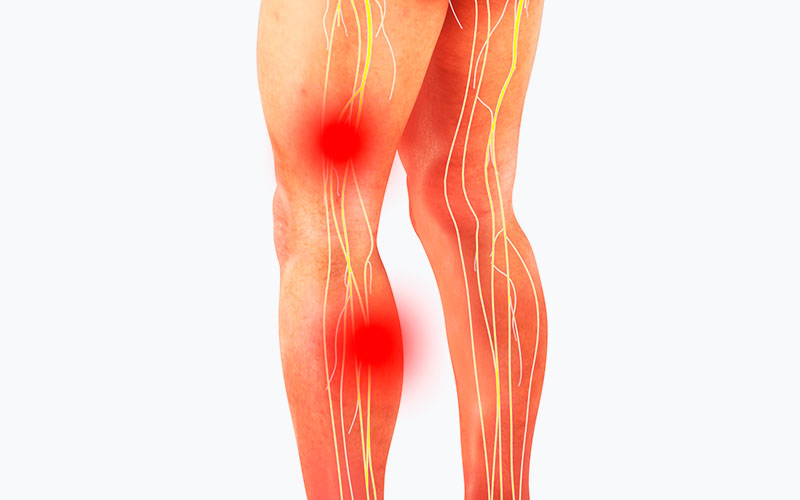Sciatica
Your sciatic nerve starts at your spinal cord, runs through the hips, and branches down into each leg, and it is the sciatic nerve that allows you to control and feel your legs.

Sciatica is the name given to pain that affects the sciatic nerve; it is also often referred to as lumbar radiculopathy or radicular pain.
What causes sciatica?
Sciatica is a term used to describe symptoms that are caused by an underlying condition where the sciatic nerve becomes inflamed. There are a number of medical conditions that can cause sciatica, including:
- Lumbar spinal stenosis
- Degenerative disc disease
- Spasms in the lumbar or pelvic muscles
- Pregnancy
- Sacroiliac joint dysfunction
- Spondylolisthesis
- Herniated lumbar discs
- Tumors or blood clots
The pain may be exacerbated if you are inactive, overweight, or wear high heels.
What are the risk factors for developing sciatica?
You are more likely to develop sciatic pain if you:
- Frequently put strain on your back, including sitting still for long periods or regularly lift heavy objects.
- Are older
- Have diabetes
- Are a smoker
What are the symptoms of sciatica?
Sciatica is typically characterized by:
- Lower back pain, this may be a sharp, shooting pain that starts in the lower back as radiates down the leg or constant, burning pain.
- Hip pain
- Leg pain that worsens when sitting
- Numbness, pain in the sciatic nerve, is often accompanied by numbness down the back of the leg, as well as tingling or weakness in some cases.
- Symptoms only on one side, sciatica tends to affect only one leg, although it is possible for both to be affected.
- Trigger postures, sciatica symptoms may get worse when sitting, standing up, twisting or lying down
Pain from sciatica varies depending on the underlying condition, ranging from mild and infrequent to incapacitating, and may worsen if the spinal nerve root has become irritated or compressed.
When should you see a doctor?
You should seek immediate attention if you have numbness or weakness in one or both your legs or if you experience a loss of bladder or bowel control as sciatica symptoms may be indicative of a more serious underlying medical condition.
In most cases, non-surgical interventions such as medication and physical therapy will resolve sciatica. But for ongoing, chronic conditions, surgical options such as a lumbar laminectomy or a discectomy may be necessary depending on the underlying condition causing the sciatic pain.
Get Assistance from the Spinal Specialists
If you are experiencing sciatica, you should consult with spine specialists who will be able to identify the underlying condition and suggest an appropriate treatment plan. The Northwest Surgical Specialist team can offer an accurate diagnosis and will work with you to resolve your sciatic pain and improve your quality of life.